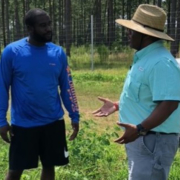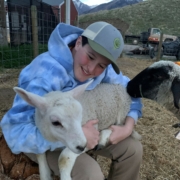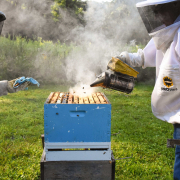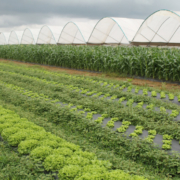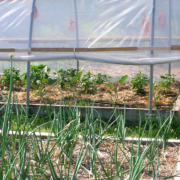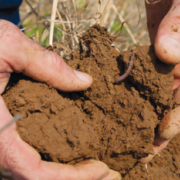So, You Want to a Start a Farm?
 Print This Post
Print This Post
By Rockiell Woods, NCAT Gulf States Regional Director
So, you woke up this morning and you said to yourself, I think I want to be a farmer. Well, that’s interesting. But can you be a farmer? And do you really want to? I have visited dozens, probably hundreds, of farms in my career. I have met new farmers who started in the business only to be kicked hard by a frost or a low-priced market, or other factors beyond their control. I have also met farmers who started with a little bit of money, a small amount of land, and no supplies or experience and ultimately went on to build successful farms. Having a lot of money, a big piece of ground, and years of farming experience can help, but that is not the only way to become a successful new farmer.
This blog will cover a short set of key questions you should ask yourself when considering starting a farm. Your answers will help you think about whether farming is right for you and help get you started in your planning process.
Where is your heart?
The first question is about your heart. What do you feel about wanting to be a farmer? Do you want to be a farmer because you like animals? Because you like plants and gardening? Because you want to have access to the land? Because you want to provide people with good food? Because you want to make money from your family land? These and many other questions address where your heart is in all of this. All entrepreneurs need their heart in their business. Passion drives entrepreneurs. Farms are businesses, run by entrepreneurs. Passion allows one to focus and make the commitment required to be successful. It does not necessarily matter what the reasons are behind your passion or if it’s something completely different than some of the reasons listed above. But for a farm to be a success, the operator has to have a passion about being in this business.
Where is your money?
Money is necessary to start and operate a farm. You do not necessarily need to have a million dollars to start farming, but some is required. Of course, there is an old joke that if you win a million dollars in the lottery, you can farm until you lose it all. We do not want that for you, though, of course. Here, the question about money relates to what sort of money you and/or others in your circle have that can help get the farm started and running for a while, and what sort of money you need the farm to generate to be happy and comfortable. You may have personal wealth, or maybe a modest amount is all you need to get started on your farm. You may have no money yourself, but you have some family, friends or investors that can begin to support a farm. Or perhaps you want to go and work on another farm and be a farmer that way.
As you consider money, you need to make a list of what sources of money you can bring to the farm now and in the future. This would include personal savings or financial assets that you can use to support the farm. It might also include any loans or grants that you might be able to acquire to start a farm. You also need to think initially about how much it is going to cost to run the farm, how much will it cost to grow that first crop or raise those first few animals, what sort of cash return will they generate, and what kind of revenue will they generate. By thinking about the farm as a business from the start, you will be off on much sounder footing than you would be if you start off thinking of it as a hobby. Hobby farms are fine, too, by the way. They are just managed differently than for-profit farms. Which one you want goes back to the heart question.
What are your assets?
Physical assets are the things, the physical items needed for farming. Farm assets include the land; buildings, barns, or sheds; fences; wells and ponds; roads; utilities; tractors and equipment; implements that get pulled behind the tractor; hand tools, seeds, and fertilizers; and labor and human/personnel assets.
Do you have any assets to start your farm? Do you have land? Do you have any buildings on the land? Do you have any equipment or supplies? What about labor to plant, harvest, tend, and manage all the stuff that you are going to need? If you do not have these things, what is your plan for acquiring them? Are you planning to borrow them, lease them, or buy them? Maybe you have access to volunteer labor, or maybe you do not. As you consider whether farming is right for you, it is important to make a farm plan early on that is shaped like a business plan. This will help you determine what assets you have and what assets you need to get a successful start in farming.
You also need to consider uncontrolled and abstract assets. These are things you may or may not have control over, including access to water or grazing land. Some farms don’t need water, but most do. It could be a pond, an irrigation well, water rights, or municipal water. Will you need large volumes or small? Is the water available at the times of year that you need it most? I would also throw in rented and leased land and equipment here.
A non-physical, uncontrolled asset to consider is access to markets. If you were raising hogs in Mississippi, you don’t necessarily need to have the same access to sales markets as you would if you were raising hogs in other states because Mississippi has no hog processors or packers. However, if you are raising collard greens in Mississippi, you might have bigger markets for them than you would if you were raising them in Maine.
Climate and soil are other assets to consider that we don’t have control over. Where you’re growing and where your farm is located would dictate a lot about what you should grow, what you can do, and how much work it will be. The type of soil you have can have a great influence on the success or failure of a farm, whether you are raising crops or animals.
Where is your mind?
This final question considers what things you are thinking about and what sort of knowledge base you are starting with as you begin this venture in farming. If you came from a farm family, then you have a basic knowledge that someone coming from a non-farm family may not have. If you have started in one type of farming but are switching to another type of farming, then you may need to increase your knowledge base.
In farming, you must also have self-discipline and self-direction. There are not many clear deadlines in farming, at least not many short ones. However, if you don’t meet the short deadlines like planting at the right time, then you likely won’t ever meet the long deadlines, or bring in a harvest or take animals to market.
As you can see, a farmer needs a lot of different things. Almost none of us have all of these things and many of us don’t have all of them while we’re running a farm. That should not be a deterrent. Instead, it should be motivation to assemble as many of the things that you need to be successful as you can. Start with a plan in mind so that you can have quick success, as well as long-term success in farming.
Lastly, remember that you are not alone. There are lots of farm resources out there from ATTRA, farmers.gov, your local extension office, farmer associations, and an infinite number of resources on various social media sites.
Here are some ATTRA resources to get you started:
Basic Accounting: Guidance for Beginning Farmers
Evaluating a Farming Enterprise
Financing Your Farm: Guidance for Beginning Farmers
Planning for Profit in Sustainable Farming
Podcast Episode 152: Starting a Farm
Podcast Episode 162: Starting a Farm: Soil Considerations
Podcast Episode 176: Starting a Farm: Water Issues
Please consider completing a brief survey to let us know your thoughts about the content of this blog. Thank you!

